Great jobs are disappearing, and so you need to look for a great career.
However, there are going to be several reasons why you will fail that task.
No matter how many times people say that you have to follow your passion, you will not do it.
You find it too hard or you are too lazy.
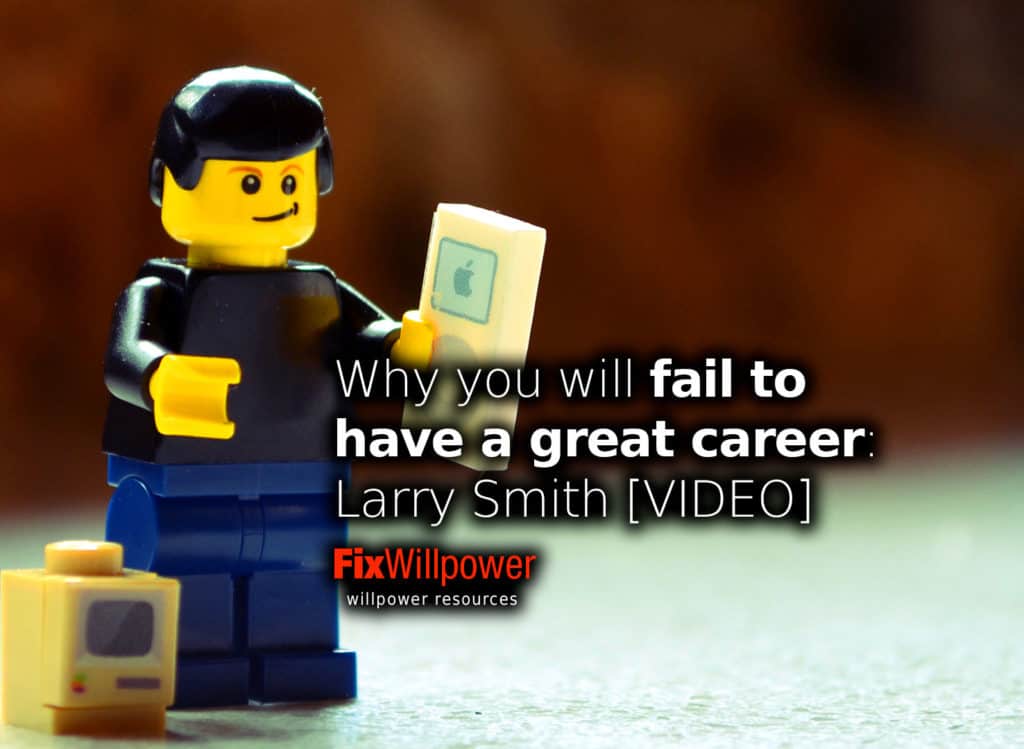
You will make excuses why you are not looking for your passion. Stop making excuses right now. I will do this after…
NO! You do it now!
Insightful and funny talk by Larry Smith.
One excuse is that you have to be lucky to get a great career. So, you will stand around hoping to get lucky.
A year from now you will be sorry you didn’t start a year ago.
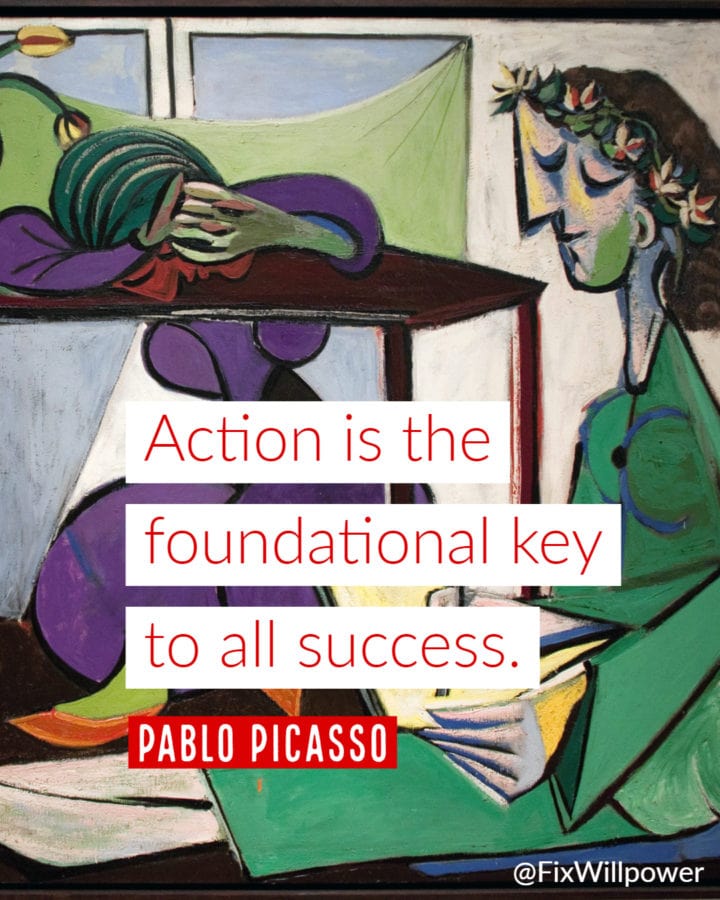
Action is the foundational key to all success. ~ Pablo Picasso
Too weird?
Get over the fear of being weird. Do whatever needs to be done to get the great results you are dreaming of. Don’t sell yourself short because you are afraid of what others might think. It’s your passion and your way of doing this, and it doesn’t matter what others think.
You are not weird?
Another excuse. I would do this, but I’m not weird. People who follow their passion are obsessive, strange, weird, etc. But I am normal and nice. But I really want a good career. So I’ll just work really, really, really hard and get to have a great career. NOT!
Working hard at average may not get you to great. So, stop for a minute and think, what will happen if you continue to work hard at your good career in 30 years. Will it become a great career?
Passion
Now you think, oh, I’m interested in this very interesting thing X.
Yay!
I look at all human activities, and this is it. I’m interested! Sign me up! But there’s a catch; interest does not equal passion. You need dozens of interests, and then one of them might ignite the passion in you.
To find your passion, list the things you are interested in. Check out this post Make a List of Your Interests. And be sure to check out this video How To Find And Do Work You Love by Scott Dinsmore.

If you settle for merely interesting, you will miss the opportunities to really matter and make a difference.
Create your great career
If you only look at the areas where you already have passion, then you will miss out on some great opportunities.
There are two sides to passion. First, you love it! Your passion is something that gets you going. Second, you should feel that you are doing great in that area. That’s the catch. There are many more areas where you suck than those where you excel.
Your great career may hide in those areas.
Only focusing on the things you are good at limits your potential. For example, there was a time when I didn’t know how to snowboard. Now I can!
How I built my passion
Years ago, I was so bad at public speaking that it was cringe worthy. But I needed public speaking to build my business.
I started to grind.
I took every opportunity to speak at conferences and teach people in seminars. I did it for free. I spent hours creating my slide decks. I spent even more hours rehearsing the presentations in front of a mirror. I put 30 to 60 minutes of preparation into every minute on stage.
I didn’t even consider that this is my passion.
I figured that there are two types of people: those who are afraid of public speaking, and those who lie.
I started to get more opportunities to speak at events. Mainly because I didn’t suck that much anymore, and because I did it for free.
Every time I had an opportunity to get on the stage, I put countless hours into preparation.
Step by step, event by event, I got better. It was slow as molasses. I mean, I have seen some of my friends develop warp-speed compared to me. But still, I got better.
The progress was incremental, and there were no dramatic breakthroughs.
Today, more than 10 thousand hours of preparation and over 500 events later, I love public speaking.
Of course, I could love it and still suck at it. But I routinely get very positive feedback.
Now let’s get back to beginning, more than 10 years ago.
If someone had told me that teaching and public speaking would be the main source of my income, I wouldn’t have believed it.
Grind.
Build your passion!
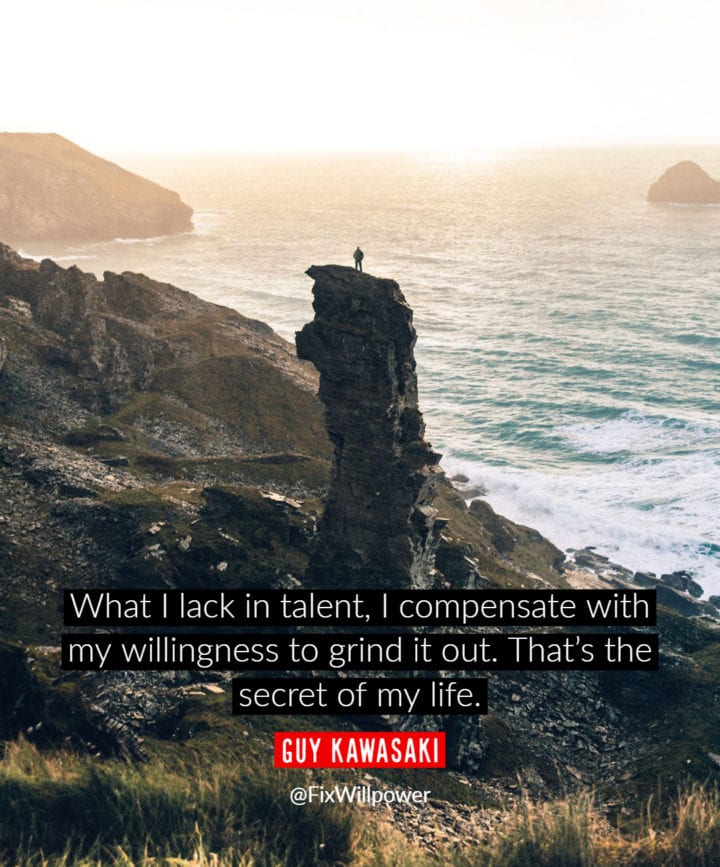
What I lack in talent, I compensate with my willingness to grind it out. That’s the secret of my life. ~ Guy Kawasaki
The intersection of your interests
Another route to success and passion is to combine several interests into one skill. Dilbert’s author Scott Adams came up with an idea of how to hack competition. You combine three things where you are in the top 25%. Competition in that intersection of interests is only 1 to 2 percent of what you would see if you competed in just one area.
For example, Scott Adams was OK-ish cartoonist, who wrote average jokes, and had some insight into the corporate culture. Combining those skills into one made him stand out. You can read his article about career advice here.
What are the three skills you can combine to become the best in the world?
Share this post with friends who would need help figuring out their careers.
More excuses
But even if you find your passion, you can still fail. You invent a new excuse to avoid taking action. You say that you will not sacrifice your personal life, friends, family at the expense of great accomplishment. Understand that this is an excuse. Do you really want to look at your spouse and your kids and see your jailers? (Read What are the Important Things in Your Life).
You shield yourself with the excuse of human relationships.
- You are afraid to look ridiculous
- You are afraid to try.
- You are afraid you may fail.
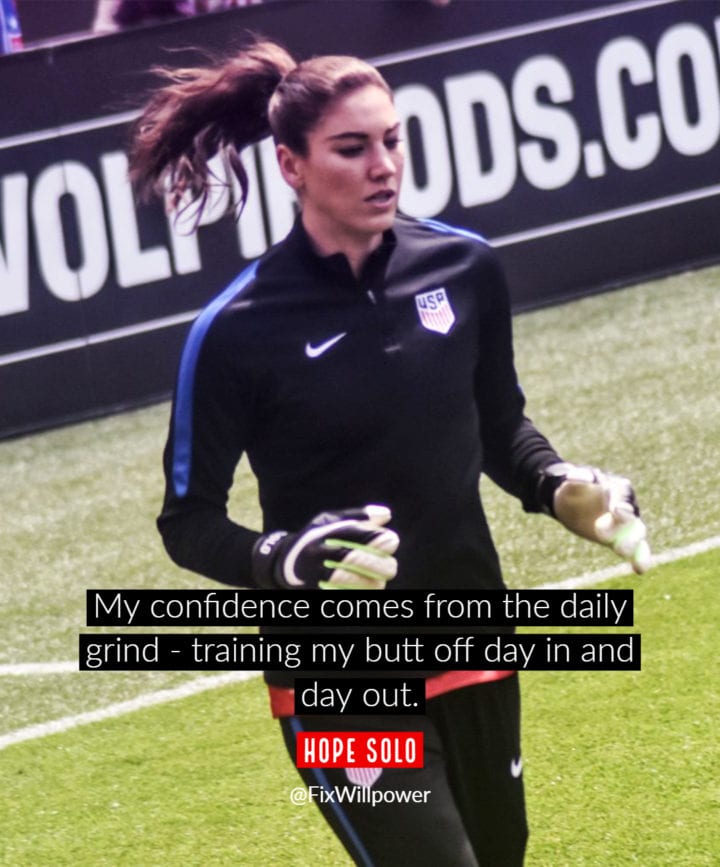
My confidence comes from the daily grind – training my butt off day in and day out. ~ Hope Solo
And that’s why you will not have a great career!
Unless!
Throughout his three-decade career, Larry Smith has inspired legions of students to take up the mantle of economics. His passionate and homespun tales of economic wizardry motivate and inspire. Larry has also coached and mentored countless numbers of students on start-up business management and career development strategies.
Having taught introductory microeconomics, macroeconomics and entrepreneurship classes, he recently celebrated assigning his 29,000th grade earlier this year.
Larry is a recipient of the Distinguished Teacher Award. He has also coached several of his former students to help them position and develop their businesses. The most famous is Research in Motion (RIM), maker of the revolutionary BlackBerry wireless mobile smartphone.
Larry also sits on the advisory panels of start-ups to provide his guidance on financing and negotiation with investors and venture capitalists.
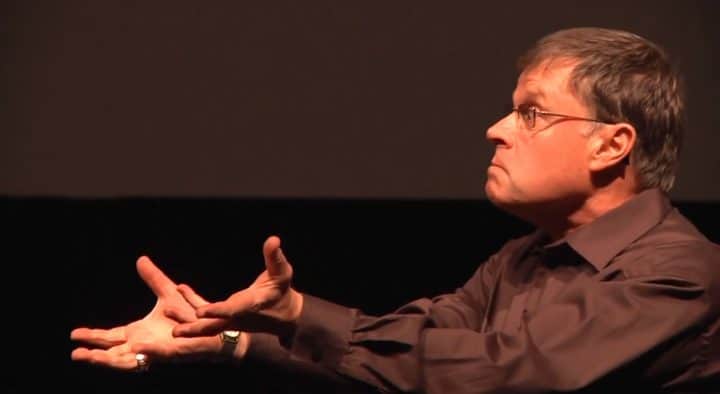
Why you will fail to have a great career: Larry Smith at TEDxUW – YouTube.
Want more from your career and life? [SLIDES]
Live by this single sentence
Be generous and expert, trustworthy and clear, open-minded and adaptable, persistent and present.
Generous
Being generous means helping others. Become a mentor, teach others the skills that have made you successful. Perform random acts of kindness. Train yourself to be calm and kind.
Understand that everyone is carrying the load they can. Even those who you think are slackers. Find out if you can do anything to lessen the load or make them stronger. For example, if you know a more effective way of doing something, then share that knowledge.
By lessening their load, you give them time to enjoy life more or be more productive. Your gift will help them help others in turn.

Real generosity toward the future lies in giving all to the present. ~ Albert Camus
Expert
Give it your all. Every time! Work like you know that someone will judge your results. But do it every day, even if there’s no one evaluating your results. Learn from every mistake attempt to improve every day. Become the best possible version of yourself in a given field.
You can learn even better by teaching others. Use the Feynman technique to learn new things and share what you have learned with your peers.
Trustworthy
Promise is a strong word, use it sparingly. Always do what you have promised. Don’t promise the things that you can’t deliver. You can always promise to give it your best effort and then do everything you can.
Behave in a way that you would like everybody else to behave. Be the rock your companions can depend on. When your companions have problems, stand strong to deflect the storm while they collect themselves and recover.
Clear
Always speak your mind. Tell the truth and do not obfuscate your message to gain favor. Simplify your language. Don’t use big words where simple words will do the trick. If you don’t understand something say so. You might learn something.
Open-minded
Every person you meet will have something to teach you. Everyone has a story that’s worth listening. It doesn’t matter how expert you are, there’s always something more to learn and experience. In important matters, make an effort to argue the other side. You might find something that you haven’t seen before. Learn about how detaching yourself from your view will give you the perspective you do not have.
Be curious! Find out how things work, why people act the way they do. Seek understanding, so you can see the connections and create new ideas.
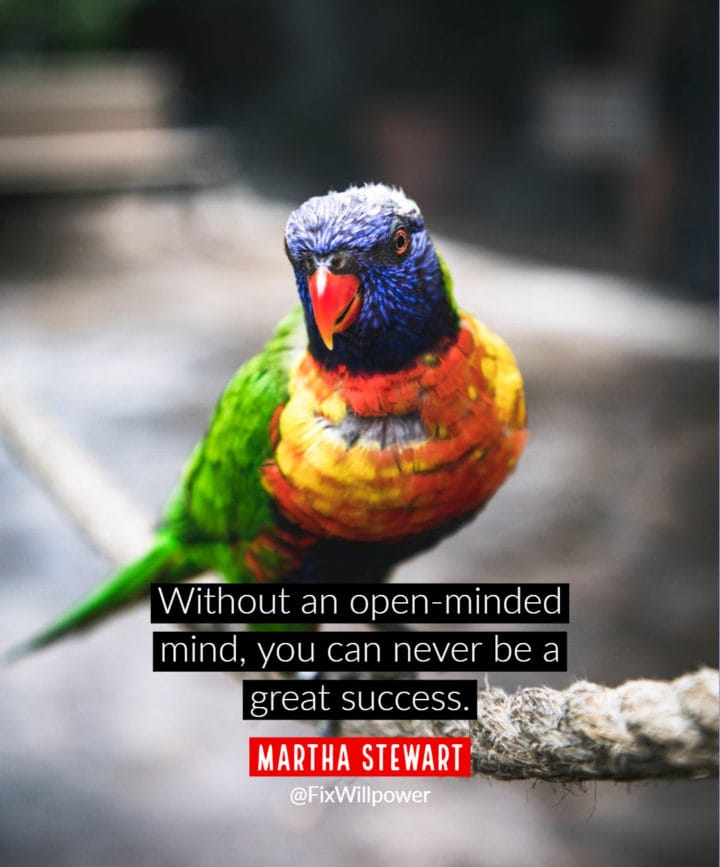
Without an open-minded mind, you can never be a great success. ~ Martha Stewart
Adaptable
Plan for the worst and hope for the best. Be prepared and flexible. Whatever happens, evaluate the situation and use your head to find the best solution that helps you and the ones around you.
Life is in constant motion and the tools you used yesterday may need tweaking today. Tomorrow you may need a completely new tool set. Even if you have the right tools, there may be ways to improve them. When did you last sharpen your saw?
Persistent
As Winston Churchill said: Never ever give up. In nothing! Not in the small things and definitely not in important matters. Sweat the small stuff, pay attention to detail, then you move towards the bigger goals. The winners are those that didn’t give up. Everything that has value needs work. The more value you want, the more work you need to put in.
Grind, become the person who masters boring. Get through the long patches of tedious tasks and emerge victoriously. Be relentless, be the one who will not stop until you reach your goal.
Be the person who plans 5, 10, or even 20 years ahead. You can achieve almost anything in 10 to 20 years. There are few things that can stand against the steady application of human effort.
Remember that inconsistency is the main obstacle to your success.
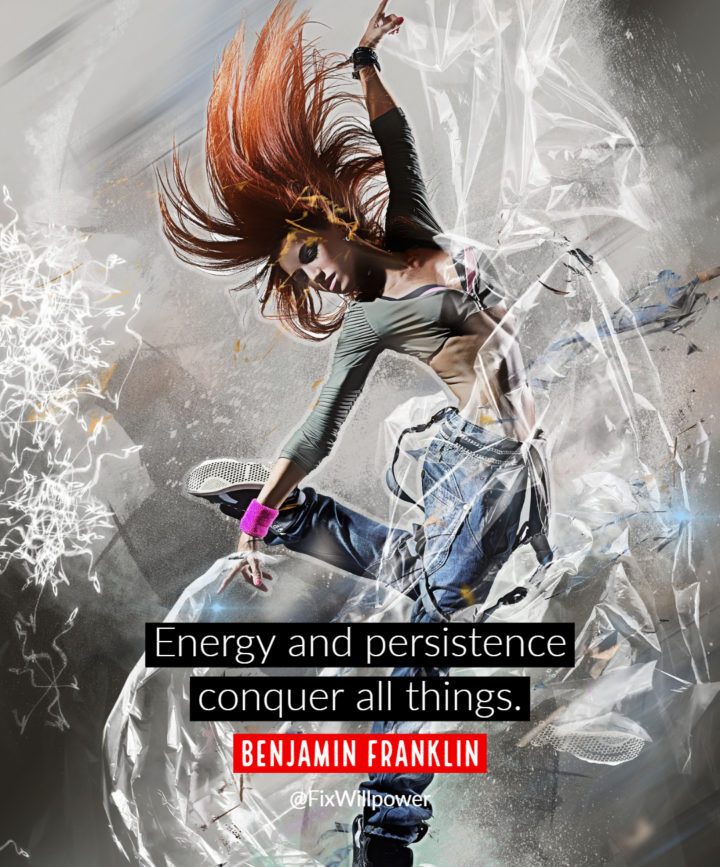
Energy and persistence conquer all things. ~ Benjamin Franklin
Present
Be mindful of other people and the events around you. Turn off notifications. Put away your phone when you are talking with people. Focus on the things at hand and do not multi-task. Take in all the details as they happen.
Don’t be disrespectful. People know when you are not paying attention. Maybe you are exhausted? Let them know it’s not a good time. Maybe you don’t have the time? If you don’t want to get involved, let people know and walk away. If you decide to engage, give it your full attention.
Mindful response to unexpected events
Create a habit that, when something unexpected happens, react with these mental steps:
Surprised – Hmmm, interesting, why did this happen. Why did that person do that peculiar thing? Most times, surprise is a natural emotion to weird events. However, the key is to replace anger with surprise. If you can deflect anger, then you have much more brainpower to deal with the situation.
Interest – So, why did this thing happen? Why did that person act in this manner? Focus on what happened, why it happened, and how you can improve the situation. When you are genuinely interested in the event, then you are much more likely to come up with creative solutions.
Learn – After you resolve the situation. Recall the sequence of events and reflect on what happened. Only a minute or two of thinking it through will make help you deal better with similar situations in the future.
Emergencies
Of course, there are emergencies when people may be in clear danger. Suspend your mindfulness exercise and act in a way to minimize potential harm.
Train your mindfulness in the less critical situations, so you would be calm and composed when real emergencies come up.
How to be that person who lives by these rules?
Create a routine that you can follow. Routine and discipline are the key factors in getting the results you want.
But what if I don’t have any discipline?
Start small! The first thing is to improve your willpower. You may have almost none now, but you can build it like a muscle. Do something every day that increases your self-control and willpower. For example:
- Start brushing your teeth with the weaker hand
- Do one push up every morning
- Make your bed when you wake up
Don’t do them all at once. Start with one, add the next one in two or four weeks. Start to incorporate your work into willpower exercises. Whenever you have to do something that you don’t want to do, think about it as a willpower exercise.
The superior man is the providence of the inferior. He is eyes for the blind, strength for the weak, and a shield for the defenseless. He stands erect by bending above the fallen. He rises by lifting others. ~ Robert G. Ingersoll
Habits
When your behavior becomes a habit, then you have to exert less willpower to complete these actions. Some research shows that building a habit takes more than 2 months. The 21-day habit building is a myth.
If you really want a habit to stick, then complete a 90-day or even longer challenge. For my daily writing habit to stick it took almost half a year.
It’s totally worth it. If you can do important tasks automatically, you will be on your way to a better life.
___________________________
Photo credit: jamjar

![Read more about the article Take a Day Off to Enjoy Your Life [Regularly]](https://fixwillpower.com/wp-content/uploads/take-a-day-off-429x314.jpg)
![Read more about the article Call An Old Friend to Keep in Touch and Build Your Network [STEPS]](https://fixwillpower.com/wp-content/uploads/call-an-old-friend-429x314.jpg)
![Read more about the article Living Beyond Limits by Amy Purdy [VIDEO]](https://fixwillpower.com/wp-content/uploads/2013/08/Living-Beyond-Limits-Amy-Purdy-429x320.jpg)
![Read more about the article What are the Most Important Things in Life? [2025]](https://fixwillpower.com/wp-content/uploads/important-things-in-life-429x314.jpg)